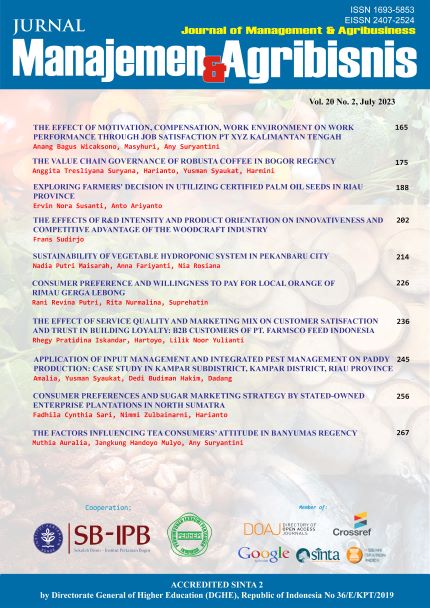Consumer Preference and Willingness To Pay For Local Orange of Rimau Gerga Lebong
Abstract
The increasing demand and consumption of oranges have led many local governments to participate in developing superior local orange varieties that are acceptable to consumers, such as the local orange variety called "rimau gerga lebong" from Bengkulu Province. This study aims to analyze consumers' preferences and willingness to pay for rimau gerga lebong oranges. Primary data for the study were collected through an online survey of 200 respondents who have purchased and consumed oranges in Bengkulu, Sumatera Selatan, and Jambi regions. The survey was conducted from April to May 2022. The data were analyzed using a discrete choice experiment (DCE) and willingness to pay (WTP) analysis. Four attributes were considered in the DCE and WTP analyses: taste, water content, freshness, and price. The results indicate that consumers prefer gerga oranges due to their fresh, high water content, and sweet taste attributes. Furthermore, consumers are willing to pay a higher price, with a maximum additional price of Rp. 936.08/kg for fresh oranges, Rp. 497.59/kg for juicy oranges, and Rp. 307.89/kg for sweet oranges. Improving the quality of orange attributes according to consumer needs can lead to increased profits. The findings of this study provide valuable insights for breeders and marketers to ensure that orange quality aligns with the needs and desires of consumers. Based on these findings, several managerial implications can be formulated to enhance and maintain orange attributes.
Keywords: discrete choice experiment, orange attributes, preference, utilty product, willingness to pay
Authors
Authors who publish with this journal agree to the following terms:
- Authors retain copyright and grant the journal right of first publication with the work simultaneously licensed under a Creative Commons Attribution License that allows others to share the work with an acknowledgement of the work's authorship and initial publication in this journal.
- Authors are able to enter into separate, additional contractual arrangements for the non-exclusive distribution of the journal's published version of the work (e.g., post it to an institutional repository or publish it in a book), with an acknowledgement of its initial publication in this journal.
- Authors are permitted and encouraged to post their work online (e.g., in institutional repositories or on their website) prior to and during the submission process, as it can lead to productive exchanges, as well as earlier and greater citation of published work (See The Effect of Open Access).

